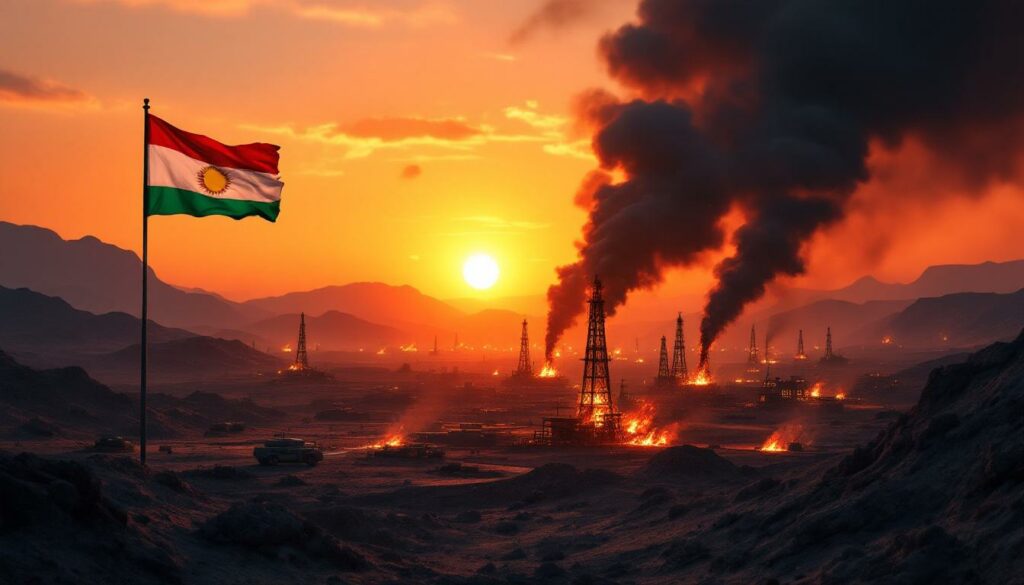How Are the Attacks on Kurdish Oil Fields in Iraq Reshaping Regional Dynamics?
The recent series of attacks on Kurdish oil fields in Iraq represent more than just disruptions to energy infrastructure—they symbolize the complex power struggle between the Kurdistan Regional Government (KRG) in Erbil and Iraq's Federal Government (FGI) in Baghdad. At its core, this conflict centers on sovereignty rather than merely oil resources, with each side pursuing fundamentally different visions for Kurdistan's future.
The Sovereignty Dispute at the Heart of the Conflict
The tensions between Baghdad and Erbil stem from fundamentally different interpretations of Iraq's 2005 Constitution. The KRG maintains that Articles 112 and 115 grant it authority to manage oil and gas resources extracted from fields not in production in 2005. They further argue that Article 115 assigns all powers not explicitly granted to the federal government to regional authorities.
Baghdad, however, interprets Article 111 differently, asserting that oil and gas belong to "all the people of Iraq in all regions and governorates" and should therefore be managed centrally through federal institutions.
This constitutional ambiguity has created a legal battleground where both sides claim legitimate authority, turning oil resource management into a proxy fight for broader autonomy questions.
Timeline of Escalating Tensions
The conflict over Kurdish oil exports has evolved through several key phases:
- April 2013: The KRG passed legislation allowing independent oil exports if Baghdad failed to pay its share of oil revenues
- 2014: The "Budget Payments-for-Oil Deal" was established, where Baghdad would send 17% of the federal budget (approximately $500 million monthly) in exchange for Kurdistan exporting up to 550,000 bpd through federal channels
- 2017: Kurdistan held an independence referendum that passed with overwhelming support, triggering intervention from regional powers including Iran, which moved forces into the region
- March 25, 2023: Baghdad imposed an embargo on all independent oil sales from Kurdistan, which remains in effect
The cycle of agreements and breakdowns has created a deep trust deficit between the parties, with each accusing the other of failing to honor commitments.
What Impact Have the Recent Attacks Had on Kurdish Oil Production?
The series of coordinated attacks on multiple oil fields in Kurdistan have had devastating effects on the region's energy sector and economy, creating both immediate production losses and long-term investment uncertainties.
Targeted Facilities and Production Losses
Recent attacks have targeted several key oil production sites:
- Sarsang field (operated by HKN Energy)
- Tawke field
- Peshkabour field
- Khurmala facility
- Ain Sifni operations
These coordinated strikes have slashed Kurdistan's crude output by approximately 50%, reducing production from around 300,000 barrels per day (bpd) to approximately 150,000 bpd. This represents a significant blow to the KRG's financial independence.
In economic terms, this production collapse translates to approximately $4.8 billion in annual revenue losses for the KRG, based on pre-embargo production levels of 400,000 bpd at roughly $32 per barrel.
"The timing of these attacks—occurring just as diplomatic pressure was mounting for resolution—raises questions about whether they serve as a form of 'negotiation by other means.'" – Energy security analyst
Who's Behind the Attacks?
While no group has officially claimed responsibility for the attacks, the precision and targeting suggest sophisticated planning:
- The KRG has suggested Iran-backed Iraqi paramilitary groups (such as Hashd al-Shaabi) may be responsible
- Baghdad has rejected these accusations
- The attacks coincided with renewed U.S. pressure for both sides to find a negotiated settlement to the oil embargo
The technical sophistication of the attacks—primarily using coordinated drone strikes to disrupt foreign-operated sites—indicates potential state-level support or expertise. According to reports from AP News, these drone attacks specifically targeted Western oil companies operating in the region.
How Does This Conflict Reflect Broader Geopolitical Rivalries?
The dispute between Baghdad and Erbil is deeply intertwined with regional and global power dynamics, with major powers backing different sides in what has become a proxy battlefield for competing interests.
International Backers and Their Interests
Baghdad's Supporters:
- Russia and China: Both powers have strategic interests in maintaining Iraq's territorial integrity and limiting Western influence
- Iran: Provides support to various militia groups and has consistently opposed Kurdish independence
Erbil's Supporters:
- United States: Has historically supported Kurdish autonomy, particularly following Kurdish assistance in fighting ISIS
- Western oil companies: Several international firms have signed direct deals with the KRG, bypassing Baghdad
A senior Iranian energy source quoted by Oilprice.com revealed the strategic thinking behind Iran's position: "By keeping the West out of energy deals… the end of Western hegemony in the Middle East will become… the West's final demise."
Strategic Implications Beyond Oil
The conflict has implications that extend far beyond energy markets:
- Military positioning: The Kurdistan Region serves as a strategic location for monitoring operations against Iran, hosting U.S. intelligence assets
- Regional stability: Kurdish independence aspirations affect neighboring countries with Kurdish populations, including Turkey, Iran, and Syria
- Energy security: Kurdistan's oil reserves represent a potentially independent source of energy for Western markets
The precedent set in 2014-2017, when Russia gained significant control over KRG oil infrastructure following the independence referendum, demonstrates how quickly energy assets can become geopolitical leverage points. The resulting oil price crash analysis showed how vulnerable regional production can be to political instability.
What Are the Economic Stakes for Kurdistan and Iraq?
The financial implications of this dispute are substantial for both parties, with control over oil revenue representing the key to economic viability and political power.
Kurdistan's Economic Vulnerability
Prior to the March 2023 embargo, Kurdistan was producing approximately:
- 350,000-400,000 bpd of crude oil
- Generating essential revenue for the KRG's budget
- Supporting public sector salaries and infrastructure development
According to World Bank data from 2022, oil revenues funded approximately 80% of the KRG's regional budget, creating extreme dependency on this single revenue stream.
The combination of the embargo and recent attacks has created severe economic pressure on the KRG, potentially forcing it to accept less favorable terms from Baghdad. Public sector salary payments have been delayed, infrastructure projects halted, and economic growth stunted.
Baghdad's Financial Leverage
The Federal Government has proposed a new variation of the 2014 agreement, offering:
- Immediate transfer of all Kurdistan oil production to federal control (SOMO)
- A payment of $16 per barrel to the KRG based on minimum delivery of 230,000 bpd
- Additional production to be included under the same mechanism
This proposal would effectively centralize control of Kurdistan's oil revenues in Baghdad, significantly reducing the KRG's financial independence.
As Simon Watkins noted in the Oilprice.com analysis: "Money is the key to success for any state… both [sides] have spent years asserting control over finances."
What Legal Frameworks Are Being Contested?
The constitutional ambiguity regarding resource management has created space for competing interpretations and claims, turning legal frameworks into political battlegrounds.
Constitutional Interpretations
The dispute centers on different readings of Iraq's 2005 Constitution:
KRG's Position:
- Articles 112 and 115 grant authority to manage oil from fields not in production in 2005
- Regional law takes precedence when disputes arise with federal authorities
Baghdad's Position:
- Article 111 establishes that oil and gas belong to all Iraqi people
- Central government should manage these resources for equitable distribution
The KRG maintains that "The Constitution provides that… priority shall be given to the law of the regions," establishing legal grounds for its independent oil sector development.
International Oil Contracts
The KRG has signed numerous production-sharing contracts with international oil companies, which Baghdad considers illegal:
- In May 2023, Iraq filed complaints against the KRG for signing gas contracts with two U.S. companies
- Baghdad maintains that all energy contracts must be approved by federal authorities
- International companies operating in Kurdistan face potential legal and political risks
This contractual uncertainty has already prompted some major players like ExxonMobil to withdraw from KRG operations in 2023, citing legal risks and the inability to secure clear title to produced resources. Moreover, the OPEC production impact on regional stability has further complicated the situation.
How Might This Conflict Be Resolved?
Several potential pathways exist for resolving the current impasse, though each presents significant challenges given the history of failed agreements.
Negotiated Settlement Options
Possible resolution frameworks include:
- Revenue-sharing agreement: A transparent mechanism for dividing oil revenues between federal and regional governments
- Constitutional clarification: Amendments to resolve ambiguities in the current constitutional framework
- International mediation: Third-party facilitation of negotiations between Baghdad and Erbil
Any successful agreement would need to address both the immediate revenue distribution questions and the underlying sovereignty concerns that drive the conflict.
Obstacles to Resolution
Several factors complicate efforts to reach a sustainable agreement:
- Trust deficit: Years of broken promises and failed agreements have eroded trust between parties, with at least three major deals collapsing since 2014
- External interference: Regional powers have vested interests in specific outcomes
- Political considerations: Leaders on both sides face domestic pressure not to compromise
The alignment of Baghdad's position with Russian and Chinese interests further complicates resolution efforts, as Western diplomatic pressure faces countervailing forces from other global powers. The ongoing oil price trade war has added another layer of complexity to the situation.
What Does the Future Hold for Kurdish Oil Production?
The outlook for Kurdistan's oil sector depends largely on how the current standoff is resolved, with several distinct scenarios possible.
Scenarios for Kurdistan's Energy Sector
Scenario 1: Continued Embargo and Attacks
- Further decline in production capacity
- Exodus of international investors
- Severe economic hardship in Kurdistan
Scenario 2: Negotiated Settlement
- Resumption of exports under modified terms
- Potential for gradual production recovery
- Continued tensions over implementation
Scenario 3: De Facto Independence
- Alternative export routes (though geographically challenging)
- New partnerships with international actors
- Ongoing security challenges
The technical challenges of establishing alternative export routes through Turkey or other neighboring countries remain significant, requiring both infrastructure investment and diplomatic breakthroughs.
Long-term Implications
The resolution of this dispute will have lasting consequences for:
- Regional stability in the Middle East
- The viability of Kurdish autonomy aspirations
- International investment in Iraq's energy sector
- The balance of power between regional and global actors
As the Oilprice.com analysis concludes: "The resolution… will have lasting consequences for regional stability" that extend far beyond the immediate economic impacts. The ongoing US oil production decline may also influence how global powers approach this regional conflict.
FAQ: Understanding the Kurdish Oil Field Attacks
Why is control over oil exports so important to Kurdistan's autonomy?
Control over oil exports provides the financial foundation for Kurdistan's semi-autonomous status. Without independent revenue streams, the KRG would be entirely dependent on Baghdad for budgetary allocations, severely limiting its political autonomy and decision-making capacity.
How have international oil companies responded to the attacks?
Many international companies have scaled back operations or implemented enhanced security measures. Some firms are reconsidering their investments in the region due to the increased political and security risks, while others are pursuing legal protections through their home governments.
ExxonMobil's 2023 withdrawal from KRG operations serves as a cautionary example of how legal uncertainty can drive major investors away from even promising resource opportunities.
Could these attacks lead to a broader regional conflict?
While the attacks have remained targeted at oil infrastructure thus far, there is potential for escalation if regional powers become more directly involved. The situation remains volatile, with multiple armed groups operating in the area and competing geopolitical interests at stake.
The precedent of Iran's 2017 military movements following Kurdistan's independence referendum demonstrates how quickly energy disputes can evolve into security threats. The tariff-threat oil easing in other markets has little influence on this regional dynamic.
What impact might this have on global oil markets?
While Kurdistan's production represents a relatively small portion of global oil supply (approximately 0.3-0.4%), disruptions can still impact regional market dynamics and specific buyers who rely on Kurdish crude. The greater concern for markets is the potential for wider regional instability.
How are ordinary Kurdish citizens affected by this dispute?
The economic impact has been severe for ordinary citizens in Kurdistan. Public sector salary payments have been delayed, infrastructure projects halted, and economic growth stunted. The region faces significant humanitarian challenges if the situation continues without resolution.
With oil revenues funding approximately 80% of the KRG budget before the crisis, the current production collapse has created ripple effects throughout the Kurdish economy and society.
Disclaimer: This analysis contains forecasts about potential geopolitical developments and energy market outcomes that are inherently uncertain. Readers should consult multiple sources and expert opinions before making investment or policy decisions based on these scenarios.
Ready to Stay Ahead of Major Mineral Discoveries?
Discovery Alert's proprietary Discovery IQ model instantly notifies investors about significant ASX mineral discoveries, turning complex data into actionable insights before the broader market responds. Explore how historic discoveries have generated substantial returns by visiting our dedicated discoveries page and begin your 30-day free trial today.




